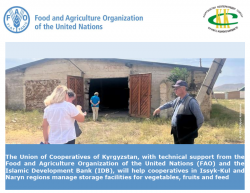
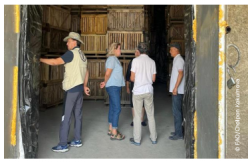
Kyrgyzstan’s farmers take pride in their fruits, vegetables, and meat, which have gained recognition not only within the country but also beyond its borders. Every year, Ton and JetyOguz regions yield bountiful apricots and apples, Kochkor excels in potato production, and Dzhumgal specializes in meat. While a portion of the harvest is sold immediately, farmers endeavor to store the remainder for sale during the winter and spring. Aitbek Aldakulov, the head of the Akdan cooperative in the Kochkor region, where potatoes and feed are grown, highlights a pressing issue: «Unfortunately, our storage capacity for fruits, vegetables, and feed is insufficient, resulting in significant harvest losses. Modern storage facilities could address this problem and mitigate price fluctuations that typically occur from February onwards.» Indeed, when local storage
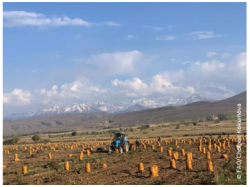
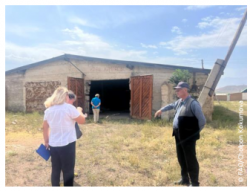 depletes, vegetables and fruits are imported at higher costs. Adequate winter storage for animal feed is also pivotal, as it provides essential nutrition during a season when fresh grass and pasture are inaccessible. The Union of Cooperatives in Kyrgyzstan is committed to helping cooperatives in Ton, JetyOguz, Kochkor, and Dzhumgal districtsenhance their institutional capabilities to manage and share warehouse facilities. This infrastructure will be established with technical and financialsupport from the FAO project “Supporting the development of sustainable value chains for climate-smart agriculture” (TCP/KYR/3804) and the Islamic Development Bank (IDB) project “Development of irrigated agriculture in the Issyk-Kul region» and Naryn regions.»
depletes, vegetables and fruits are imported at higher costs. Adequate winter storage for animal feed is also pivotal, as it provides essential nutrition during a season when fresh grass and pasture are inaccessible. The Union of Cooperatives in Kyrgyzstan is committed to helping cooperatives in Ton, JetyOguz, Kochkor, and Dzhumgal districtsenhance their institutional capabilities to manage and share warehouse facilities. This infrastructure will be established with technical and financialsupport from the FAO project “Supporting the development of sustainable value chains for climate-smart agriculture” (TCP/KYR/3804) and the Islamic Development Bank (IDB) project “Development of irrigated agriculture in the Issyk-Kul region» and Naryn regions.»
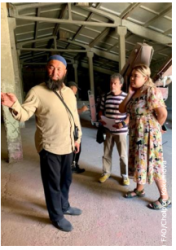
Brief information: The Islamic Development Bank (IDB) launched the project “Development of Irrigated Agriculture in Issyk-Kul and Naryn Regions”, the overall goal of which is to improve the standard of living of the rural population through sustainable development of agriculture and water resources management with adaptation to climate change. FAO, through its technical cooperation program “Supporting the development of sustainable value chains for climate-smart agriculture”, has committed to providing technical assistance to strengthen the institutional framework and capacity of agricultural cooperatives in these target areas.

